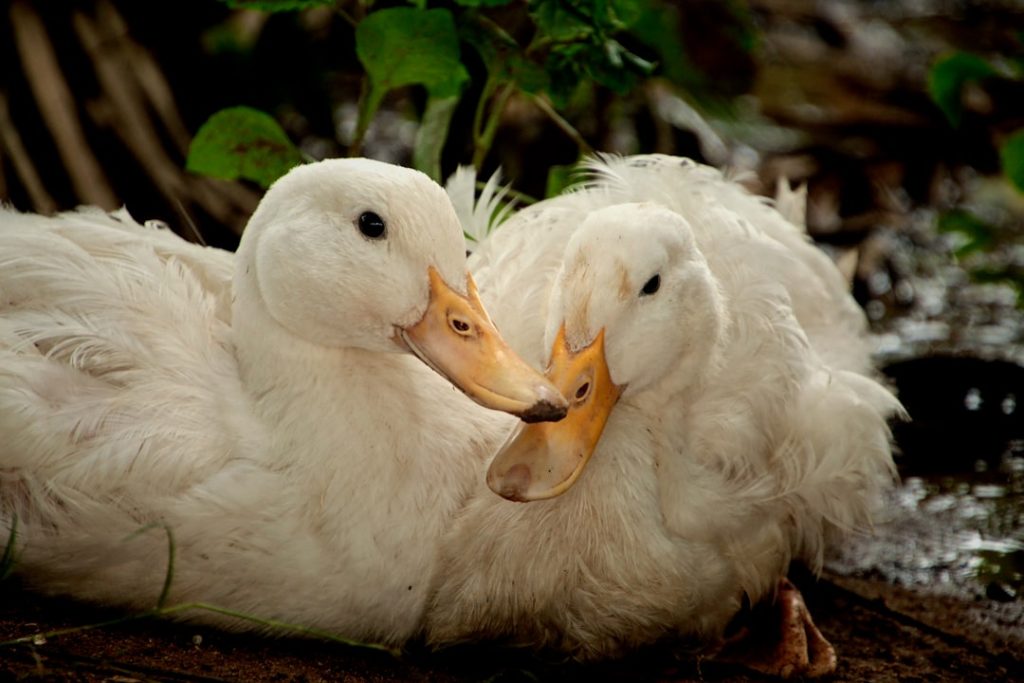Hybrid duck breeds are the result of crossbreeding different purebred duck species to create a new and unique breed. These hybrids are often bred for specific traits such as increased egg production, better meat quality, or improved resistance to diseases. By combining the desirable characteristics of different duck breeds, hybrid ducks can offer a range of benefits to farmers and backyard enthusiasts alike. These ducks can have a wide variety of physical characteristics, including different colors, sizes, and feather patterns, depending on the breeds that were crossed. Hybrid duck breeds can also exhibit a combination of behavioral traits from their parent breeds, making them an interesting and diverse addition to any flock.
Hybrid duck breeds are often bred for specific purposes, such as egg production, meat quality, or pest control. By crossing different purebred duck species, breeders can create hybrids that excel in these areas, providing farmers and backyard enthusiasts with ducks that meet their specific needs. These hybrids can also exhibit hybrid vigor, which is the phenomenon where the offspring of two different breeds are healthier and more robust than either of the parent breeds. This can result in hybrid ducks that are more resistant to diseases, have better growth rates, and are generally hardier than purebred ducks. With their unique combination of traits and characteristics, hybrid duck breeds offer a versatile and valuable option for those looking to raise ducks for various purposes.
Table of Contents
Key Takeaways
- Hybrid duck breeds are a cross between two different duck breeds, resulting in offspring with a combination of traits from both parent breeds.
- Raising hybrid duck breeds can offer benefits such as increased disease resistance, better egg production, and improved meat quality.
- Popular hybrid duck breeds include the Khaki Campbell, Golden Hybrid 300, and Cherry Valley, known for their high egg production and fast growth.
- Tips for raising and caring for hybrid duck breeds include providing a balanced diet, adequate shelter, and access to clean water for swimming and foraging.
- Breeding and genetics of hybrid duck breeds involve careful selection of parent breeds to achieve desired traits, and understanding the inheritance patterns of different traits.
- Challenges of raising hybrid duck breeds may include potential health issues due to genetic diversity and the need for specialized care to meet their specific needs.
- The future of hybrid duck breeds may involve continued breeding efforts to develop new and improved hybrid varieties with desirable traits for both egg and meat production.
The benefits of raising hybrid duck breeds
Raising hybrid duck breeds can offer a range of benefits to farmers and backyard enthusiasts. One of the main advantages of raising hybrid ducks is their ability to exhibit hybrid vigor, resulting in ducks that are generally healthier and more robust than purebred ducks. This can lead to better growth rates, improved resistance to diseases, and overall hardier ducks that require less maintenance and care. Additionally, hybrid ducks are often bred for specific purposes such as egg production or meat quality, meaning that they can excel in these areas and provide farmers with a reliable source of eggs or meat.
Another benefit of raising hybrid duck breeds is their diverse range of physical and behavioral traits. By crossing different purebred duck species, breeders can create hybrids with a wide variety of colors, sizes, and feather patterns, making them an interesting and visually appealing addition to any flock. Additionally, hybrid ducks can exhibit a combination of behavioral traits from their parent breeds, offering farmers and backyard enthusiasts with ducks that have a unique and diverse range of personalities. This can make raising hybrid ducks an enjoyable and rewarding experience, as each duck can have its own individual characteristics and quirks.
Popular hybrid duck breeds
There are several popular hybrid duck breeds that are commonly raised by farmers and backyard enthusiasts. One of the most well-known hybrid duck breeds is the Khaki Campbell, which is a cross between the Indian Runner, Rouen, and Mallard ducks. The Khaki Campbell is highly prized for its exceptional egg-laying abilities, often producing over 300 eggs per year. This makes them a popular choice for those looking to raise ducks for egg production. Another popular hybrid duck breed is the Golden 300 Hybrid, which is a cross between the Pekin and Khaki Campbell ducks. The Golden 300 Hybrid is also known for its high egg production, making it a valuable addition to any flock.
The Saxony is another popular hybrid duck breed that is a cross between the Rouen, Pekin, and Blue Pomeranian ducks. The Saxony is prized for its excellent meat quality and calm temperament, making it a popular choice for those looking to raise ducks for meat production. Additionally, the Welsh Harlequin is a popular hybrid duck breed that is a cross between the Khaki Campbell and Runner ducks. The Welsh Harlequin is known for its excellent egg-laying abilities and beautiful silver coloration, making it a visually appealing and productive addition to any flock.
Tips for raising and caring for hybrid duck breeds
When raising and caring for hybrid duck breeds, there are several important tips to keep in mind to ensure the health and well-being of your ducks. Firstly, it’s important to provide your hybrid ducks with a suitable living environment that includes access to clean water for swimming and drinking, as well as shelter from predators and the elements. Additionally, providing your ducks with a balanced diet that includes a mix of commercial feed, fresh greens, and access to insects and other natural foods will help to keep them healthy and thriving.
Regular health checks and vaccinations are also important when raising hybrid duck breeds to prevent the spread of diseases and ensure the overall well-being of your flock. It’s also important to provide your ducks with regular access to fresh water for swimming and bathing, as this is essential for maintaining their plumage and overall health. Finally, providing your ducks with plenty of space to roam and exercise will help to keep them happy and healthy, as well as reduce the risk of behavioral issues such as aggression or boredom.
Breeding and genetics of hybrid duck breeds
Breeding and genetics play a crucial role in the development of hybrid duck breeds. When breeding hybrid ducks, it’s important to carefully select the parent breeds based on the desired traits you want to achieve in the offspring. This can include traits such as egg production, meat quality, or specific physical characteristics. By crossing different purebred duck species that exhibit these traits, breeders can create hybrids that excel in these areas.
The genetics of hybrid duck breeds can be complex, as they inherit traits from both parent breeds. This can result in a wide range of physical characteristics and behavioral traits in the offspring, making each hybrid duck unique. Additionally, breeders must carefully manage the breeding process to ensure genetic diversity within the flock and prevent inbreeding, which can lead to health issues and reduced productivity in the offspring. By understanding the genetics of hybrid duck breeds and carefully managing the breeding process, breeders can create hybrids that exhibit the desired traits and characteristics while maintaining genetic diversity within the flock.
Challenges of raising hybrid duck breeds

While there are many benefits to raising hybrid duck breeds, there are also some challenges that farmers and backyard enthusiasts may face when raising these ducks. One challenge is managing the diverse range of physical and behavioral traits exhibited by hybrid ducks. Because they inherit traits from both parent breeds, hybrids can vary widely in terms of size, coloration, egg production, and temperament. This can make it challenging to predict the characteristics of the offspring when breeding hybrid ducks.
Another challenge is managing the breeding process to maintain genetic diversity within the flock while preventing inbreeding. This requires careful planning and record-keeping to ensure that each duck is bred with suitable mates to maintain genetic diversity and prevent health issues in the offspring. Additionally, because hybrid ducks are often bred for specific purposes such as egg production or meat quality, it’s important to carefully select the parent breeds based on these desired traits to achieve successful results.
The future of hybrid duck breeds
The future of hybrid duck breeds looks promising as they continue to offer a range of benefits to farmers and backyard enthusiasts. With their ability to exhibit hybrid vigor, resulting in healthier and more robust ducks, as well as their diverse range of physical and behavioral traits, hybrid duck breeds offer a versatile and valuable option for those looking to raise ducks for various purposes. As breeders continue to carefully manage the breeding process and select parent breeds based on desired traits, the development of new hybrid duck breeds with improved characteristics will likely continue.
Additionally, as more people become interested in raising ducks for egg production, meat quality, or pest control, the demand for productive and resilient hybrid duck breeds is likely to increase. This will drive further research and development into creating new hybrid duck breeds that excel in these areas while maintaining genetic diversity within the flock. Overall, the future of hybrid duck breeds looks bright as they continue to offer a valuable and diverse option for those looking to raise ducks for various purposes.
If you’re interested in learning more about hybrid duck breeds, you might also want to check out an article on PoultryWizard about creating a unique and functional chicken coop, complete with a trampoline for your feathered friends. This article provides innovative ideas for enhancing the living environment of your poultry, which could be applied to ducks as well. You can read the full article here.
FAQs
What are hybrid duck breeds?
Hybrid duck breeds are the result of crossbreeding different purebred duck species to create new and unique duck varieties with specific traits.
What are the benefits of hybrid duck breeds?
Hybrid duck breeds often exhibit desirable traits such as increased egg production, better meat quality, and improved disease resistance. They may also have better foraging abilities and adaptability to different environments.
What are some popular hybrid duck breeds?
Some popular hybrid duck breeds include the Khaki Campbell (a cross between Mallard, Rouen, and Runner ducks), the Golden 300 Hybrid (a cross between Pekin and Khaki Campbell ducks), and the Cherry Valley (a cross between Pekin and Khaki Campbell ducks).
How do you care for hybrid duck breeds?
Caring for hybrid duck breeds involves providing them with a suitable living environment, proper nutrition, access to clean water for swimming and drinking, and regular health checks to ensure their well-being.
Can hybrid duck breeds reproduce?
Yes, hybrid duck breeds can reproduce, but their offspring may not always exhibit the same traits as the parent breeds. This is due to genetic variability and the unpredictable nature of hybridization.
Meet Walter, the feathered-friend fanatic of Florida! Nestled in the sunshine state, Walter struts through life with his feathered companions, clucking his way to happiness. With a coop that’s fancier than a five-star hotel, he’s the Don Juan of the chicken world. When he’s not teaching his hens to do the cha-cha, you’ll find him in a heated debate with his prized rooster, Sir Clucks-a-Lot. Walter’s poultry passion is no yolk; he’s the sunny-side-up guy you never knew you needed in your flock of friends!







